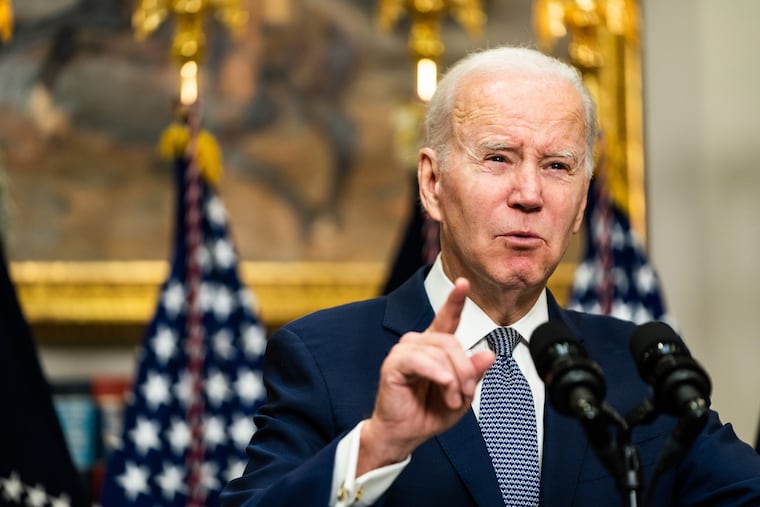What Biden’s executive order on guns means for background checks and ‘red flag’ laws
President Joe Biden signed an executive order Tuesday that aims to strengthen and increase background checks to buy guns as well as other measures. Here's what it means on the local level.

President Joe Biden signed an executive order Tuesday that aims to toughen gun laws in the United States.
The executive order looks to increase the number of background checks to as close to universal as possible without requiring additional legislation, the White House said. The executive order will also boost federal support for “red flag” laws, which states use to stop gun sales to people considered dangerous.
Biden’s camp touted the policy — which the president signed while meeting with families of victims of the Monterey Park, Calif., Lunar New Year shooting — as the country’s most comprehensive yet, but it doesn’t directly add new gun-control measures. Instead, it puts the onus on federal agencies and federally licensed gun dealers to ensure weapon sales comply with current laws.
» READ MORE: In Philly Chinatown, a vigil for California shooting victims
The order lays out a list of directions for Biden’s cabinet that fall into three categories:
Keeping guns out of dangerous hands
Holding the gun industry accountable
Supporting communities impacted by gun violence
Measures include increasing the number of background checks by working with the attorney general to ensure checks that sometimes get missed happen, implementing “red flag” laws, improving public awareness, accelerating reporting of ballistics data, accelerating the enactment of the Bipartisan Safer Communities Act — gun-violence reduction legislation signed by the president last year — and encouraging the Federal Trade Commission to report on how gun manufacturers market firearms to people.
» READ MORE: Biden signs landmark gun measure, says 'lives will be saved'
The order marks the president’s latest efforts to curb gun violence.
As noted by Reuters, his rhetoric on the issue has grown tougher over time. Biden has routinely called for the banning of assault weapons. His administration says poll results show Americans — especially but not limited to Democrats — support background checks and Democrats support stricter laws. According to Biden’s aides, he’s expected to lean into the topic of gun control as he approaches a potential 2024 reelection run.
Groups that support gun rights say the order won’t help stop rising gun violence.
According to the Guardian, opinion polls show a majority of support for universal background checks from both Republicans and Democrats. But with Republicans controlling the House, the likelihood of stricter gun legislation is slim.
What does the executive order mean locally?
So far this year, America has seen 112 mass shootings including six in Pennsylvania, according to the Gun Violence Archive. The group defines mass shootings as those with at least four victims shot, either injured or killed, not including any shooter who may also have been killed or injured. In Philadelphia, the Controller’s Office has reported 87 homicides this year, 246 nonfatal shooting victims, and 63 fatal victims as of Sunday.
Biden’s executive order aims to strengthen “red flag” laws, which are in place in 19 states and the District of Columbia. The laws allow a court to temporarily remove access to firearms from someone determined to be at risk of harming themselves or others.
But Biden’s office says the “red flag” laws, and gun laws in general, are only as effective as the public’s knowledge that they exist and how to use them. Pennsylvania does not have a version of the law in place and would not be impacted by this part of the executive order. New Jersey does. Many states’ versions of the law were enacted after the Marjory Stoneman Douglas High School shooting in Parkland, Fla., in 2018.
In Pennsylvania, some General Assembly members tried and failed to pass “red flag” laws following the Uvalde, Texas, school shooting last year.